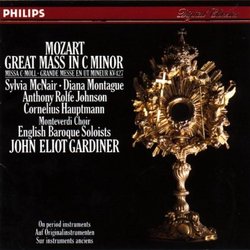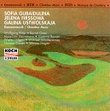| All Artists: Wolfgang Amadeus Mozart, John Eliot Gardiner, Sylvia Mcnair, Diana Montague, Anthony Rolfe Johnson, Cornelius Hauptmann, The English Baroque Soloists, The Monteverdi Choir Title: Mozart: Great Mass in C minor /McNair * Montague * Rolfe Johnson * Hauptmann * English Baroque Soloists * Gardiner Members Wishing: 0 Total Copies: 0 Label: Philips Release Date: 10/25/1990 Genre: Classical Styles: Opera & Classical Vocal, Historical Periods, Classical (c.1770-1830) Number of Discs: 1 SwapaCD Credits: 1 UPC: 028942021020 |
Search - Wolfgang Amadeus Mozart, John Eliot Gardiner, Sylvia Mcnair :: Mozart: Great Mass in C minor /McNair * Montague * Rolfe Johnson * Hauptmann * English Baroque Soloists * Gardiner
 | Wolfgang Amadeus Mozart, John Eliot Gardiner, Sylvia Mcnair Mozart: Great Mass in C minor /McNair * Montague * Rolfe Johnson * Hauptmann * English Baroque Soloists * Gardiner Genre: Classical
John Eliot Gardiner conducts Mozart's Great Mass with the Monteverdi Choir and the English Baroque Soloists. Or rather, what exists of the work: Mozart had imagined a work so ambitious it could never have been completed. ... more » |
Larger Image |
CD DetailsSynopsis
Amazon.com John Eliot Gardiner conducts Mozart's Great Mass with the Monteverdi Choir and the English Baroque Soloists. Or rather, what exists of the work: Mozart had imagined a work so ambitious it could never have been completed. What we do have--thanks partly to reconstruction by the conductor of this recording--is one of Mozart's most idiosyncratic works, rich in contrasts between the past (Bach and Handel) and the present (modern Italian composition). A wonderful disc. --Joshua Cody Similar CDs
Similarly Requested CDs
|
CD ReviewsMozart's sturdy reliability, topped with pure delight 04/02/1999 (5 out of 5 stars) "I am drawn to this recording for several reasons: the crisp clarity of the Monteverdi Choir, John Eliot Gardiner's sprightly interpretation of Mozart's Great Mass, and, most of all, soprano Sylvia McNair's amazingly warm, rich, and controlled voice that blends beautifully with the straight tones of the chorus.One of my pet peeves, as a choral singer, is soloists' failure to reflect and adapt to the character of the ensemble in pursuit of their own idea of tonal beauty and an often operatic aesthetic. In this recording the soloists could have been drawn from the chorus, so great is their consistency with the sound ideal of Eliot Gardiner's Montiverdi Choir. An ensemble -- chorus and soloists together -- that can accomplish this has gained a rare level of artistry. Eliot Gardiner has, once again, achieved this level. The result is a recording that is far from sterile, one that reverberates with warmth and passion without overwhelming a listener with a huge choral sound.This recording of a classic Mozart mass is a perennial favorite of mine -- and McNair's singing of the "Et incarnatus est" could melt marble. In it her voice becomes one of the instruments in Mozart's beautiful orchestration. It is a tribute to McNair's versatility that another favorite recording of mine (Sure Thing) features her renditions of Jerome Kern songs, accompanied by Andre Previn on the piano. She seems equally at home in both classical and popular genres, and she is a delight to listen to." Oh my what a yummy mass... ewomack | MN USA | 06/04/2003 (5 out of 5 stars) "I have enjoyed everything I've bought by the Monteverdi Choir and the English Baroque Soloists when conducted by John Eliot Gardiner. Usually they're on the Archiv label (I'll buy almost anything on Archiv), but since I loved the recordings they made of Bach's St Matthew Passion, Mass in B Minor, Beethoven's Missa Solemnis, and the fortepiano versions of Mozart's Piano Concertos, I lapped this one up even though it's not on Archiv. This is another great recording by Gardiner and crew. As usual, the choir is tremendous and powerful. The soloists soar and the orchestra, though somewhat understated and occassionally - though I'm sure by intention - drowned out by the amazing choir, provides an incredible backdrop. The Mass is an amazing and sadly unfinished work, just like Mozart's Requiem. Fans of the well known K 626 will also love this one. It has a similar feel and sound to it, though the piece simply ends during the Sanctus and was not completed in the way the Requiem was by Mozart's student Sussmayr.I was almost scared off by the text on the back of the CD cover: "revised and reconstructed by Alois Schmitt & John Eliot Gardiner." This makes it sound like they reworked the entire piece, when in fact it's only the last few sections that were worked over due to the paucity of Mozart's actual notes. All the info you need on this is in the CD booklet, along with a good story about the history of the piece.Gardiner et al refuse to disappoint. Add this one to your mass collection." Tops among C Minor Mass recordings dsyee | Cambridge, MA United States | 05/01/2002 (5 out of 5 stars) "I own four recordings of this work. At least, I believe I do, but all except this one have turned into coasters. The Gardiner recording, in my mind, clearly stands out as the finest. It displays all the desirable qualities of period recordings - crispness, clarity, authenticity - without nearly any of the drawbacks.Listeners who are hardcore fans of heavy, "big" Mozart may be turned off, but otherwise I can't imagine anyone not being completely engrossed by this recording. The "clean" period sound may be less melodramatic than Karajan or Marriner (unfortunately Te Kanawa seemed to have entered "diva" stage by the time she made that recording; I had the distinct impression she loved her voice more than the music itself), but certainly Gardiner's trademark "fast" tempos don't get in the way of expressivity and emotion. On the contrary, the clarity of the orchestra and Gardiner's Monteverdi Choir lets the music take center stage - ideal for one of Mozart's most emotive and harmonically interesting works.Even if those qualities were missing, though, Sylvia McNair alone would justify buying this disc. On my first listen-through of the "Et incarnatus est," I found myself gasping for air as I was unconsciously trying to prevent my own breathing from interfering with hearing her voice. Her performance could be described as "angelic," if that word weren't so overused, and her solo in the "Christe" is equally divine: pure, effortless, and refined. Diana Montague also puts in a beautiful and underrated performance in the "Laudamus Te.""
|

 Track Listings (13) - Disc #1
Track Listings (13) - Disc #1











